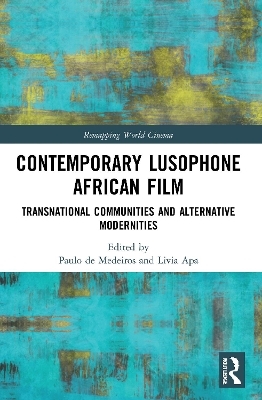
Contemporary Lusophone African Film
Routledge (Verlag)
978-0-367-52316-9 (ISBN)
The collection brings together 11 chapters by recognized scholars, who analyze a variety of films and videos from Angola, Cape Verde, Guiné-Bissau, and Mozambique. It also includes an interview with Pedro Pimenta, one of the most distinguished African film festival organizers. Drawing on various theoretical perspectives, the volume strives to reverse the relative invisibility that has afflicted these cinemas, arguing that most, if not all, Lusophone films are transnational in all aspects of production, acting, and reception. The initial three chapters sketch broad, comparative overviews and suggest theoretical approaches, while the ensuing chapters focus on specific case studies and discuss a number of key issues such as the convergence of film with politics, the question of gender and violence, as well as the revisiting of the period immediately following independence. Attention is given to fiction, documentary films and recent, short, alternative video productions that are overlooked by more traditional channels. The book stresses the need to pay attention to the significance of African film, and Lusophone African film in particular, within the developing field of world cinema.
Bringing together general overviews, historical considerations, detailed case studies, and focused theoretical reflections, this book is a significant volume for students and researchers in film studies, especially African, Lusophone cultural studies, and world cinema.
Paulo de Medeiros is Professor of English and Comparative Literary Studies, with a focus on Modern and Contemporary World Literatures, at the University of Warwick. As member of the Warwick Research Collective, one of his current projects is a study of Postimperial Europe. Livia Apa is a member of the Center for Studies on Contemporary Africa (CESAc) at the University of Naples 'L’Orientale'. She works on literary and cultural studies in Portuguese-speaking countries, focused on African cinema, migrations, and cultures of the diaspora, linguistic rights, and contemporary African thought.
Introduction: Situating Lusophone African Cinema ; 1. Lusophone African Cinema as World-Cinema ; 2. Lusophone Filmmaking in the realm of transnational African cinemas: from ‘global ethnic’ to ‘global aesthetic’ ; 3. Sounds of Liberation: Sarah Maldoror’s Sambizanga (1972) and Miguel Gomes’ Tabu (2012) ; 4. Resistance and Political Awareness Through the Eye-Camera of Sarah Maldoror ; 5. The eleventh island: Cape Verde, the moving images and its diaspora ; 6. Postcolonial Testimony and the ruins of empire ; 7. In the Name of the Rosa: The Ethnographic Reflex in the Cinema of Licínio Azevedo ; 8. From the tabanca to Bissau, from Bissau to the Diaspora: Social Narratives in the Bissau-Guinean Popular Cinema ; 9. The Representation of Ritual and Cinema as a Ritual in Revolutionary Mozambique: Ruy Guerra’s ‘Mueda, Memória e Massacre’ ; 10. A melancholic outlook on 40 years of lusophone audio-visual production and Guinea, the two faces of the war as case study ; 11. ‘We need to dress ourselves in the black light’: an authorial analysis of Lusophone African cinema - Flora Gomes’s case ; 12. Pedro Pimenta, in Interview with Livia Apa
| Erscheinungsdatum | 18.04.2024 |
|---|---|
| Reihe/Serie | Remapping World Cinema |
| Zusatzinfo | 34 Halftones, black and white; 34 Illustrations, black and white |
| Verlagsort | London |
| Sprache | englisch |
| Maße | 156 x 234 mm |
| Gewicht | 326 g |
| Themenwelt | Kunst / Musik / Theater ► Film / TV |
| Geisteswissenschaften ► Geschichte | |
| Naturwissenschaften ► Geowissenschaften ► Geografie / Kartografie | |
| Sozialwissenschaften ► Kommunikation / Medien ► Medienwissenschaft | |
| Sozialwissenschaften ► Soziologie ► Spezielle Soziologien | |
| ISBN-10 | 0-367-52316-7 / 0367523167 |
| ISBN-13 | 978-0-367-52316-9 / 9780367523169 |
| Zustand | Neuware |
| Informationen gemäß Produktsicherheitsverordnung (GPSR) | |
| Haben Sie eine Frage zum Produkt? |
aus dem Bereich


